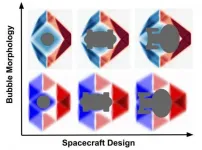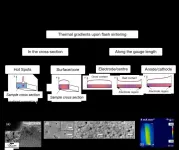Unconscious biases can drive foodborne illness outbreaks, MU researchers find
Study concludes outbreak prevention policies should account for inadvertent behaviors.
2021-03-09
(Press-News.org) COLUMBIA, Mo. - In the midst of a pandemic that has claimed more than 2 million lives worldwide and disrupted nearly every facet of society since it appeared more than a year ago, understanding the factors that create and facilitate disease outbreaks is more important than ever. Now, researchers at the University of Missouri have determined that cognitive biases -- patterns of errors in thinking that affect judgments and behaviors, often unconsciously -- can help create and worsen foodborne disease outbreaks.
"Unethical behavior isn't always intentional; conflicts of interest and other unconscious motivations can lead people to behave in ways that help outbreaks emerge and spread," said Harvey James, associate director of the division of applied social sciences and a professor of agricultural and applied economics in the MU College of Agriculture, Food and Natural Resources (CAFNR). "If we can understand what motivates a store owner to re-open too early or a food producer to cut corners, then we can create better policies and regulations that nudge people in the right direction without restricting their freedoms."
James and Michelle Segovia, an assistant professor of agricultural and applied economics in CAFNR, were eager to apply the science of behavioral ethics to the field of food safety. Behavioral ethics examines why people make ethical and unethical decisions; to see how those choices might contribute to a foodborne disease outbreak, the researchers turned to the case of Jensen Farms.
In 2011, the Colorado cantaloupe producer was found to be responsible for an outbreak of Listeria at its packing plant that led to one of the worst foodborne illness outbreaks in U.S. history, resulting in 33 deaths across 28 states. The outbreak occurred despite Jensen Farms having recently audited their food safety procedures and installed new cleaning equipment.
To explain this contradiction, the researchers identified several forms of cognitive bias at work. Motivated blindness, for instance, encourages a person or company to advance their own interests without accounting for conflicts of interest. In the case of Jensen Farms, James and Segovia theorized that motivated blindness was to blame for the choice to hire a lenient auditor that deemed the company's food safety procedures "superior."
In addition, the researchers emphasized the unconscious nature of cognitive biases with an example of omission bias, in which the lack of action, rather than a specific harmful action, can create unfortunate consequences. Though Jensen Farms possessed equipment capable of cleaning cantaloupes with an antibacterial wash, the antibacterial function was not used prior to the outbreak.
"Jensen Farms believed they were making their cantaloupes safer even as they failed to take actions that could have prevented an outbreak," James said. "This is a perfect example of the fact that unethical behavior does not need to be a conscious act. There isn't always an easy 'villain,' so if laws and policies only address people who are intentionally propagating an outbreak, we are missing a big part of the picture. This study is a step toward recognizing the immense consequences of inadvertent and unintentional behavior."
While COVID-19 is not considered a foodborne illness, James believes that the lessons learned about cognitive biases from the study are relevant to the current pandemic. Motivated blindness, for example, could explain why some restaurants and other businesses have refused to abide by lockdown orders for fear of losing business. Herding behavior -- a bias that occurs when people follow the crowd even if they disagree with the crowd's behavior -- explains the surge in demand for certain essential items and subsequent nationwide shortages.
INFORMATION:
The study, "Behavioral Ethics and the Incidence of Foodborne Illness Outbreaks," was published in the Journal of Agricultural and Environmental Ethics. Funding was provided by Hatch Project Number MO-AC011AC047.
[Attachments] See images for this press release:

ELSE PRESS RELEASES FROM THIS DATE:
2021-03-09
WHAT:
Approximately two years after establishing a human cerebral organoid system to study Creutzfeldt-Jakob disease (CJD), National Institutes of Health researchers have further developed the model to screen drugs for potential CJD treatment. The scientists, from NIH's National Institute of Allergy and Infectious Diseases (NIAID), describe their work in Scientific Reports.
Human cerebral organoids are small balls of human brain cells ranging in size from a poppy seed to a pea; scientists use human skin cells to create them. CJD, a fatal neurodegenerative brain disease of humans caused by infectious prion proteins, affects about 1 in 1 million people each year. It can arise spontaneously, result from ...
2021-03-09
Philadelphia, March 9, 2021 - Schizophrenia is a neurodevelopmental disorder that disrupts brain activity producing hallucinations, delusions, and other cognitive disturbances. Researchers have long searched for genetic influences in the disease, but genetic mutations have been identified in only a small fraction--fewer than a quarter--of sequenced patients. A new study now shows that "somatic" gene mutations in brain cells could account for some of the disease neuropathology.
The study, led by senior author Jeong Ho Lee, MD, PhD, at Korea Advanced Institute of Science and Technology and the team of Stanley Medical Research Institute, appears in Biological ...
2021-03-09
According to the current BfR-Corona-Monitor of the German Federal Institute for Risk Assessment (BfR), 43 percent of the respondents have already had themselves tested for the virus. The survey, which has been conducted regularly for almost a year now, documents how the population is dealing with the situation, what they are doing to protect themselves and how they are informing themselves about the current events. "For 50 weeks now, our survey has provided insights into the current situation and its development," says BfR-President Professor Dr. Dr. Andreas Hensel. "Over time, we see that the vast majority of the population is implementing the key protective measures."
BfR-Corona-Monitor as to 2-3 March 2021:
https://www.bfr.bund.de/cm/349/210302-bfr-corona-monitor-en.pdf
Regarding ...
2021-03-09
PLYMOUTH MEETING, PA [March 9, 2021] -- New research in the March 2021 issue of JNCCN--Journal of the National Comprehensive Cancer Network from Mass General Hospital Cancer Center, Harvard Medical School, and Dana-Farber Cancer Institute finds muscle mass (quantity) correlated with survival, while muscle radiodensity (quality) was associated with symptom burden, healthcare use, and survival in patients with advanced cancer undergoing an unplanned hospitalization. The researchers also found nearly two-thirds of the patients in that population had significant muscle loss ...
2021-03-09
BUFFALO, N.Y. -- New research from the University at Buffalo suggests that breast cancer patients who drink sugar-sweetened beverages regularly are at increased risk for death from any cause and breast cancer in particular.
Compared to women who never or rarely drank non-diet soda, those who reported drinking non-diet soda five times or more per week had a 62% higher likelihood of dying from any causes, and were 85% more likely to die from breast cancer specifically. The findings were published online ahead of print March 2 in Cancer Epidemiology, Biomarkers & Prevention, a journal of the American Association for Cancer Research.
Research on soda and breast ...
2021-03-09
Researchers at Uppsala University have developed a digital self-test that trains users to assess news items, images and videos presented on social media. The self-test has also been evaluated in a scientific study, which confirmed the researchers' hypothesis that the tool genuinely improved the students' ability to apply critical thinking to digital sources.
The new tool and the scientific review of it are part of the News Evaluator project to investigate new methods of enhancing young people's capacity for critical awareness of digital sources, a key component of digital literacy.
"As ...
2021-03-09
Philadelphia, March 9, 2021--Combining computational mining of big data with experimental testing in the lab, researchers at Children's Hospital of Philadelphia (CHOP) have identified RNA editing events that influence gene expression and, in turn, the phenotypic manifestation of that expression. In analyzing so-called A-to-I RNA editing, in which the adenosine of an RNA molecule is chemically modified into an inosine, the researchers describe how a single nucleotide change by RNA editing can have large downstream effects. The findings were published today in Genome Biology.
"Millions of A-to-I RNA editing sites have been identified across the human transcriptome, but the functions of most RNA editing ...
2021-03-09
If travel to distant stars within an individual's lifetime is going to be possible, a means of faster-than-light propulsion will have to be found. To date, even recent research about superluminal (faster-than-light) transport based on Einstein's theory of general relativity would require vast amounts of hypothetical particles and states of matter that have "exotic" physical properties such as negative energy density. This type of matter either cannot currently be found or cannot be manufactured in viable quantities. In contrast, new research carried out at the University of Göttingen gets around this problem by constructing a new class of hyper-fast 'solitons' ...
2021-03-09
Researchers have demonstrated that a slimy, yet tough, type of biofilm that certain bacteria make for protection and to help them move around can also be used to separate water and oil. The material may be useful for applications such as cleaning contaminated waters.
In the journal Langmuir, North Carolina State University researchers reported the findings of an experiment in which they used a material produced by the bacteria Gluconacetobacter hansenii as a filter to separate water from an oil mixture.
"It's really remarkable to think that these little bugs can make this stuff that is so perfect in many ways," said Lucian Lucia, the study's corresponding author and an associate professor of forest biomaterials and chemistry at NC State.
The biofilm the bacteria make and ...
2021-03-09
Flash sintering is a ceramic processing technique which uses electric current to intensively heat the ceramic sample internally rather than using only external furnace heating. The process can lower ceramic processing temperatures and durations significantly, enabling ceramics to be co-processed with metals or other materials, and reducing energy use.
However, the process can result in low quality ceramics due to weaknesses caused by inhomogeneities in the microstructure.
The origins of these inhomogeneities caused by thermal gradients in the material during flash sintering have been studied by researchers ...
LAST 30 PRESS RELEASES:
[Press-News.org] Unconscious biases can drive foodborne illness outbreaks, MU researchers find
Study concludes outbreak prevention policies should account for inadvertent behaviors.






